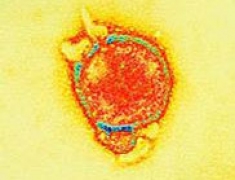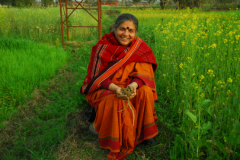
Logan and Albert Conservation Association

 CSIRO scientist Dr Deborah Middleton works in the field of Transforming Animal Biosecurity - Livestock Industries and she is the theme leader for this reseach.The research results are published online in the very scientific journal plospathogens or it is available from links as part of the media release. ABC news reported on this 31 October 2009.
CSIRO scientist Dr Deborah Middleton works in the field of Transforming Animal Biosecurity - Livestock Industries and she is the theme leader for this reseach.The research results are published online in the very scientific journal plospathogens or it is available from links as part of the media release. ABC news reported on this 31 October 2009.
The CSIRO is claiming a breakthrough in the battle against the deadly Hendra virus.
A scientific team from the CSIRO and the United States has developed a serum which gives a good level of protection to ferrets exposed to the similar Nipah virus.
They demonstrated that administering human monoclonal antibodies after exposure to Nipah virus protected the animals.
The CSIRO's Dr Deborah Middleton, who led the experiments at Geelong's maximum biosecurity facility, says the findings are extremely encouraging. "Our research clearly suggests that an effective treatment for Hendra virus infections in humans should be possible, given the very strong cross-reactive activity this antibody has against Hendra virus," she said.
"As Hendra and Nipah viruses cause severe disease in humans, a successful application of this antibody as a post-exposure therapy will likely require early intervention."
 Geoffrey Woolcock Associate Professor at Griffith University’s Urban Research Program was one of the Australian delegates at the OECD World Forum Measuring and Fostering the Progress of Societies in Istanbul in 2007. Much has been written in the current decade about children's lack of contact or opportunity for contact with natural areas - areas of bushland wilderness and creeks which have not been changed by human actions or activities. He recently delivered a talk Unnaturally natural? where he reported on the work of Richard Louv, the American author of the award-winning book Last Child in the Woods.
Geoffrey Woolcock Associate Professor at Griffith University’s Urban Research Program was one of the Australian delegates at the OECD World Forum Measuring and Fostering the Progress of Societies in Istanbul in 2007. Much has been written in the current decade about children's lack of contact or opportunity for contact with natural areas - areas of bushland wilderness and creeks which have not been changed by human actions or activities. He recently delivered a talk Unnaturally natural? where he reported on the work of Richard Louv, the American author of the award-winning book Last Child in the Woods.
Geoffrey Woolcock is a keynote speaker at Logan City's inaugral LOGAN ECO ACTION FESTIVAL 2010.
Louv’s book has compiled research from around the world, arguing forcefully for children to be reintroduced to the wilderness.
Give Mother Earth A Chance
 Dr Vandana Shiva is a physicist, environmental activist, author and eco-feminist. Speaking at the Sydney Opera House for the City of Sydney Peace Prize she delivers an incredible and inspirational lecture - online video here - Give Mother Earth A Chance. LACA members and supporters will be inspired . Watch here.
Dr Vandana Shiva is a physicist, environmental activist, author and eco-feminist. Speaking at the Sydney Opera House for the City of Sydney Peace Prize she delivers an incredible and inspirational lecture - online video here - Give Mother Earth A Chance. LACA members and supporters will be inspired . Watch here.
"If commerce starts to undermine life support, then commerce must stop, because life has to carry on." This is the central premise of Dr Vandana Shiva's passionate address in which she lambasts global corporations for waging war against nature in the name of profits. Shiva argues that when commonly used agricultural herbicides have names like "Round Up", "Squadron", "Avenge", one can see there is war being waged against nature...and the humans are winning at the cost of their own future. To Vandana Shiva, fighting for peace for 'Mother Earth' is the broadest peace movement we can engage in.
She calls for a form of 'Earth Democracy', that re-imagines the biosphere as a citizen, that has universal rights that need protecting and defending.
Vandana Shiva : Sydney Peace Prize Talk from WisdomKeepers Productions on Vimeo.
 World Environment Day (WED) is an annual event that is aimed at being the biggest and most widely celebrated global day for positive environmental action. WED activities take place all year round but climax on 5 June every year, involving everyone from everywhere. India has been named Global Host of World Environment Day 2011. Each year focuses on a topic of global significance and asks that we look at what we can do to reduce human impact on that issue.
World Environment Day (WED) is an annual event that is aimed at being the biggest and most widely celebrated global day for positive environmental action. WED activities take place all year round but climax on 5 June every year, involving everyone from everywhere. India has been named Global Host of World Environment Day 2011. Each year focuses on a topic of global significance and asks that we look at what we can do to reduce human impact on that issue.
Forests cover one third of the earth's land mass, performing vital functions and services around the world which make our planet alive with possibilities. In fact, 1.6 billion people depend on forests for their livelihoods. They play a key role in our battle against climate change, releasing oxygen into the atmosphere while storing carbon dioxide. Read more about forests services here. Ecosystem services
See LEAF's Facebook page to contact coordinator -, add your comments and more.